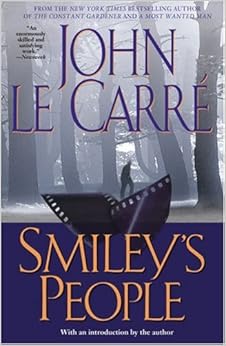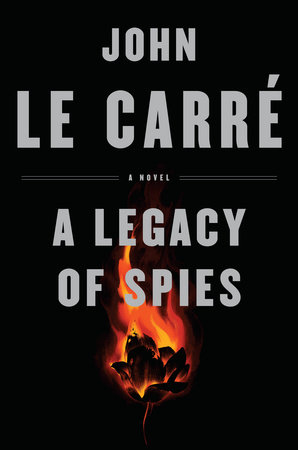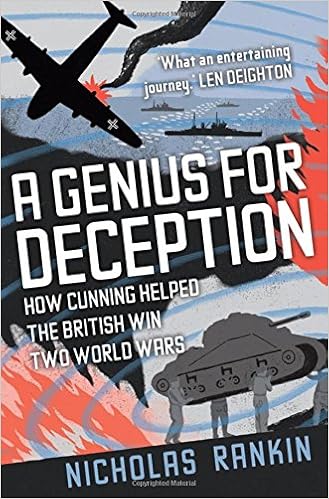You may remember that my last piece here was about the importance of empathy as illustrated by two very
different books about intelligence work: John Le Carré's Tinker Tailor Soldier Spy, and Nicholas Rankin's Masters of Deception. Today I want to go back to
those books to discuss a different topic: language.
Le Carré is renowned for his
plotting and characters but it is his use of words that dazzles me the most.
He invented a vocabulary of spying, most of it in Tinker Tailor, which is both
memorable and believable.
When TTSS
was adapted
for TV and appeared on PBS there was a full-page ad, sponsored by Mobil,
I
believe, promoting the show and explaining the vocabulary. Clearly
someone thought the average viewer would be baffled by the jargon and
give up
even before they had a chance to be baffled by the plot.
The most famous example, of
course, is mole, for a double agent, especially one who was working for Side A
even before he dug his way into the ranks of Side B. Le Carré says he
borrowed it from Russian intelligence circles although it turns out Sir Francis Bacon used it in the 1600s. Le Carré says he had not read Bacon, and why should we doubt him?. What is certain is that mole is part of everyday usage now.
Here are a few more of Le Carre's
memorable coinings:
The Circus: MI-6 , so nicknamed
for its (fictional) location in London at Cambridge Circus, but of course suggesting the chaos
that often goes on there.
Lamplighters: The secret
communication and dead letter people.
Breakage: People quitting the Circus.
Scalphunters: The dirty work
crowd, killers, kidnappers, etc.
Joe: Any agent in the
field. "I have to meet one of my joes."
Coat-trailing: Trying to
convince the other side that you are a likely candidate to work for them.
Honey trap: An attractive
person set to woo a spy with their physical charms.
And so on.
But it isn't just terminology
that makes Le Carré's language so vivid. Let's take a couple of examples
from a later book, Smiley's People. An old Russian wants to tell George
Smiley that he has acquired three facts that might be used to destroy their
deadly enemy Karla. But the coded message he gives is "I have three
proofs against the Sandman." Sends a shiver down my spine.
A few pages later Smiley reflects on the fact that a spy in
trouble immediately discards the most valuable thing he is carrying. But
here is how that comes out: "in the spy trade we abandon first what we love the most." And that brings it to a whole different level, doesn't it?
My
favorite of Le Carre's non-Smiley books is A Perfect Spy. The protagonist
of that one, Magnus Pym, is a double agent (this is not a spoiler) and he
writes a confession to his son, although he certainly knows that the boy will
never be allowed to read it. Discussing the years just after World War
II, he writes, "Vienna was a divided city like Berlin or your
father" For me, that's a real gut-punch.
What
about the new le Carre novel, A Legacy of Spies? It's very good but only
two bits of language leapt out for me. There is a safe house which Smiley
named the Stables. If that strikes you as having a mythological
reference, at least one character in the book agrees with you.
And
in a flashback we see the old spy's protege Peter Guillam demanding an
explanation of the dodgy operation they were involved in. Smiley tells
him some of the story and then asks:
"Do you now have all the information you require?"
"No."
"I envy you."
Classic
Smiley.
Moving
on to Rankin's book about deception in the wars. I was fascinated to
learn that certain important and familiar words came from World War I. (Rankin notes that they
did not appear in the famous eleventh edition of Encyclopedia Britannica, which appeared in 1911, but received major attention in the twelfth, after the war.)
Among the new words are propaganda and camouflage.
Also, in the British empire the best shooters were those who could kill
small, fast-moving marsh birds called snipes. And, of course, those
shooters were called snipers.
I knew that tank,
the word for heavily armored fighting vehicle, came from a bit of World
War I deception - they're just spare petrol tanks! - but I had not
realized that Ernest Swinton is credited with both the concept and the
name. Swinton was also a writer; his much-imitated Defence of Duffer's Drift turns what could be a pedestrtian lesson in military strategy into a fascinating story.
And speaking of writers, the Director of Information for Britain during part of the war was John Buchan, author of The Thirty-nine Steps. Oh,
and one more? During World War II, the assistant to the Head of Naval
Intelligence had to be a real extrovert, a glad-hander who could play talent-spotter, make
nice between competing agencies, and represent the office to the outside
world. The job went to a fellow named Ian Fleming. Wonder whatever happened to
him?






Another nice thing about Le Carre is that he is still going strong in his eighties, giving us all hope.
ReplyDeleteGreat column, Rob — I love you coming back to look at a book again here from a different angle, and I love the focus on language generally, so rich in this case, so interesting how a small twist can bring a line to life. Thanks for the post!
ReplyDeleteRob, nice article.
ReplyDeleteYou are correct about The Defense of Duffer's Drift teaching the civilian (and probably young, new military officers) about military strategy. Each telling of the same battle between the British and the Boers adds one more item of strategy on the British side which then changes part of the outcome of the battle. In the beginning, oversights by the British officers keep getting them slaughtered.
Love spy novels. Love spy movies. Thanks for the information.
ReplyDeleteGreat info.
ReplyDeleteBTW, if you've never seen "Any Human Heart" (available on Netflix DVDs) with Jim Broadbent, Matthew Macfadyen, and Sam Claflin all playing Logan Mountstuart, writer and human being in the middle of everything check it out. Great performances by all. But I'm bringing it up because in it, Tobias Menzies plays Ian Fleming exactly as a glad-hander who knows everyone and everything; and Tom Hollander and Gillian Anderson are definitive as the Duke and Duchess of Windsor.